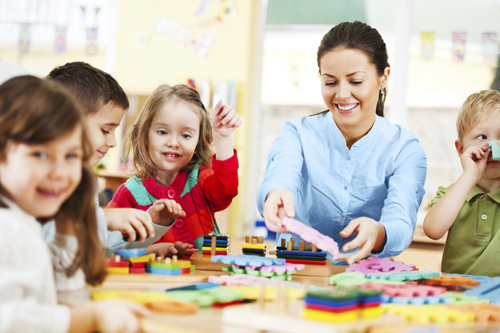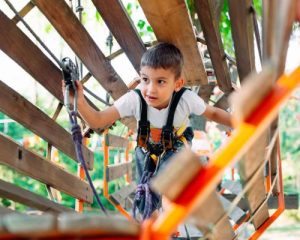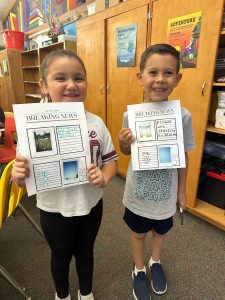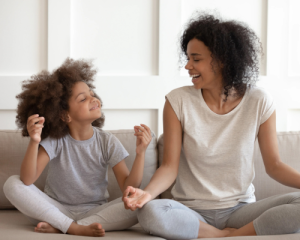
A new clinical report stresses the importance of play for children.
If your pediatrician is up on the latest prescriptions for children, you’ll be told about whatever vaccines might be needed at this age and counseled about the importance of nutritious instead of junk food. And then you’ll be asked: Is your child getting enough play?
Not sports leagues or piano practice and certainly not video games. Just plain play: building with blocks, imagining up a traveling circus in space with stuffed animals, climbing a jungle gym at the park with friends, playing a board game, putting on a talent show, turning a large box into an imaginary boat or magic castle, drawing outside with the neighborhood kids using street chalk and maybe even joining in a lively game of hopscotch.
A new clinical report by the American Academy of Pediatrics outlines the critical importance of play for children and advises pediatricians and family doctors to start prescribing it for their patients. It expresses concern that kids aren’t getting nearly enough true play, and extols all the virtues of play for children’s mental, emotional and physical health.
“[I]t enhances brain structure and function and promotes executive function (i.e., the process of learning, rather than the content), which allow us to pursue goals and ignore distractions,” the paper says. It can do more to ensure children’s future school success than early academic instruction. “Social skills, which are part of playful learning, enable children to listen to directions, pay attention, solve disputes with words, and focus on tasks without constant supervision. By contrast, a recent trial of an early mathematics intervention in preschool showed almost no gains in math achievement in later elementary school.”
There’s more reasons to play than to just get good grades. It reduces stress, gets kids exercising, brings meaningful companionship and inspires creativity. It encourages kids to experiment and take healthy reasonable risks, the pediatricians wrote.
In addition, when children exercise during play—when they toss a ball with friends or family or play a wacky game of soccer with the family dog—they’re following their body’s own cues about how much physical activity is enough. As a result, they’re less likely to injure themselves through overuse of a particular part of the body, and more likely to see exercise as fun rather than as a boring or exhausting chore.
“Play is not frivolous,” the report says. In other words, true play is at least as necessary to children’s development as alphabet books, instruction in manners and music lessons.
But what is true play? Recognizing that the idea of play has been diminished in our time, the pediatricians did their best to set out some of the defining factors.
“The definition of play is elusive,” the report says. “However, there is a growing consensus that it is an activity that is intrinsically motivated, entails active engagement, and results in joyful discovery. Play is voluntary and often has no extrinsic goals; it is fun and often spontaneous.”
In other words, play isn’t something children feel pushed into. Adults might provide some of the tools for play—the toys, the art supplies, the spaces, the visits to the beach—but children dive into play because they want to. They usually find it fun, but sometimes you also see children working out issues that have been on their minds in their imaginative play, or trying to master a skill.
Our society has fallen a distance away from the idea of play as a basic part of life. Parents fear that if they don’t fill their children’s lives with “productive” activities such as music lessons, sports teams and self-defense classes, that somehow their kids will fall behind or waste their time. It’s a competitive world out there, and we understandably want to equip our children with everything they need to come out successful in that competition. Even many preschools have become more about pre-literacy and pre-math skills than play and joyful interaction.
The pediatricians’ report asks us to consider two vital ideas: (1) Play is something that children need in order to succeed, especially in a work world that demands more in the way of innovation and creativity rather than learned information and skills; and (2) All that success might be of limited use if in the process of pursuing it, we forget about bringing fun and joy into our lives. In fact, have you forgotten about your own fun? When’s the last time you played in a way that brought you a sense of creativity, excitement and joy?
You don’t need to wait for a visit to the pediatrician to bring the gift of more play into your children’s lives. For one thing, the pediatricians’ report says, you can set aside unstructured time. You can ask your children’s teachers about the ways in which they bring playful activities into the classroom and provide room for joyful creativity. You can provide the supplies and experiences that lend themselves to play—balls and inexpensive toys that lend themselves to imaginative play. Blocks and blank paper and crayons. Sand and pails and shovels. You can ask other parents in your neighborhood about joining together to provide time and opportunity for kids to play together, and bring your child to places such as the park where other children are playing.
And don’t forget about the value of you playing with your children, an important way that parents and children bond in happy, memorable ways, the pediatricians wrote. Just remember, they said: It’s for your child. Let children take the lead on which play activities they want to do with you, and how they want to do it. This isn’t the time for you to guide the activity—when it comes to play, kids are the experts.
By Karin Klein











Leave a Reply